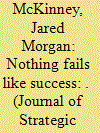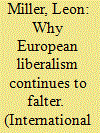|
|
|
Sort Order |
|
|
|
Items / Page
|
|
|
|
|
|
|
| Srl | Item |
| 1 |
ID:
141795


|
|
|
|
|
| Summary/Abstract |
While the Roud Index at the Vaughan Williams Memorial Library in London contains over 19,000 folk songs about wars waged by Britain and its allies, there are comparatively few composed specifically about World War One. This article explores the musical heritage of the Great War in the songs about the conflict that have been composed, or rearranged, by singers in the early twenty-first century. By studying folk songs sung during the war itself, we can learn how new folk songs draw on historical elements to create a new World War One folk canon.
|
|
|
|
|
|
|
|
|
|
|
|
|
|
|
|
| 2 |
ID:
107663


|
|
|
|
|
| Publication |
2011.
|
| Summary/Abstract |
With establishment of the U.S. Selective Service System in 1917, selective draft rules placed consideration of registrants' economic obligations to their dependents front and center. By observing the Canadian and British recruitment experiences, American policy makers opted against universal conscription since they believed it would be costly because of the need to offer family allowances and opted against a voluntary system since they believed that too many bachelors would fail to volunteer. Dependency deferments were designed to minimize the social and economic costs of war. Local board members determined whether a man was a genuine breadwinner or not, and individual discretion on this matter contributed to the higher rates of African American draftees during WWI compared to white draftees, since African American men were less likely to be recognized as genuine breadwinners. Selective Service rules thus resulted in reproducing female citizens as economic dependents and yielded durable inequalities among registrants.
|
|
|
|
|
|
|
|
|
|
|
|
|
|
|
|
| 3 |
ID:
159430


|
|
|
|
|
| Summary/Abstract |
The First World War (1914–1918) revolutionized warfare in many ways: in addition to new technologies the old and well-known one of maps acquired a crucial role in sharing information, and understanding and controlling the battlefield. This paper advances three main arguments: first, that maps became an integral part of every aspect of warfare; second, that maps became a mindset, a language to understand, rationalize, and share any kind of information; and third, that it is necessary to rethink the concept of the mapmaker and include within it the multitude of soldiers that at any level collected information.
|
|
|
|
|
|
|
|
|
|
|
|
|
|
|
|
| 4 |
ID:
161358


|
|
|
|
|
| Summary/Abstract |
During the July Crisis Britain’s foreign secretary, Sir Edward Grey, focused on organising a conference through which differences could be reconciled. After the war, he maintained that Germany’s unwillingness to join this conference was one of the immediate causes of war. This essay disputes Grey’s contention, arguing that his plans for a conference, based on a misleading analogy to the previous Balkan Crises, actually helped facilitate the outbreak of war in 1914 by sanctioning inaction in the first phase of the crisis (28 June–22 July) and by tacitly encouraging Russian mobilisation in the second phase (23 July–4 August).
|
|
|
|
|
|
|
|
|
|
|
|
|
|
|
|
| 5 |
ID:
141790


|
|
|
|
|
| Summary/Abstract |
As commander of French forces in World War I from August 1914 until December 1916, General Joseph Joffre is one of the most controversial leaders of the war. As victor of the “miracle” of the Marne, he earned almost universal respect and admiration, but in subsequent years he came under scathing criticism for the enormous French casualties and for his failure to drive the Germans out of France. A strong supporter of the American Expeditionary Forces, he was praised by General John J. Pershing as “my loyal and consistent personal friend.” This article attempts to determine whether Joffre’s failures outweigh his successes in the enormously destructive and complex war.
|
|
|
|
|
|
|
|
|
|
|
|
|
|
|
|
| 6 |
ID:
159227


|
|
|
|
|
| Summary/Abstract |
This article compares the evacuations of the two port cities of Gaza and Jaffa in southern and central Palestine, respectively, by their civilian population on the orders of Cemal Pasha, the Ottoman commander of the Syrian front, during the spring of 1917. While these evacuations are usually regarded as mutually exclusive events, they were in fact part of the same process. We claim that the general evacuation order for two of the main coastal cities of Palestine was driven by the exigency of war and military considerations, rather than by political motivations such as the desire to destroy Zionism or take revenge against the Arab population. This view does not negate the exceptionality of each case but rather aims to better contextualize them within the larger framework of civilian affairs in the region and the Empire at large during WWI. For this purpose we analyse a 17-page enciphered Ottoman telegram that sheds new light on the rationale and the execution of the evacuation of populations in Palestine and compare it to other controversial events in Greater Syria during the war.
|
|
|
|
|
|
|
|
|
|
|
|
|
|
|
|
| 7 |
ID:
131016


|
|
|
|
|
| Publication |
2014.
|
| Summary/Abstract |
With tl1e failed attempt to institute Liberalism in the aftermath of WWI it seemed the idealistic vision of perpetual peace, increased prosperity, and collective security was merely an unrealistic hope. However, the successful progression of the European Union from the European Coal and Steel Community and the European Economic Community began a new era of interstate relations. But, the repeated refusal of states to ratify the European constitution is a sign that European economic and policy integration is not enough to give Europeans a sense of shared values and principles and a sense of common heritage. The dissatisfaction over Europe's recent ?nancial woes--that were described as threatening a break-up of EU-has indicated that European Liberalism is faltering again. This article analyzes the issue from the perspective of peace research, global political economy, social psychology, and intercultural relations.
|
|
|
|
|
|
|
|
|
|
|
|
|
|
|
|
|
|
|
|
|